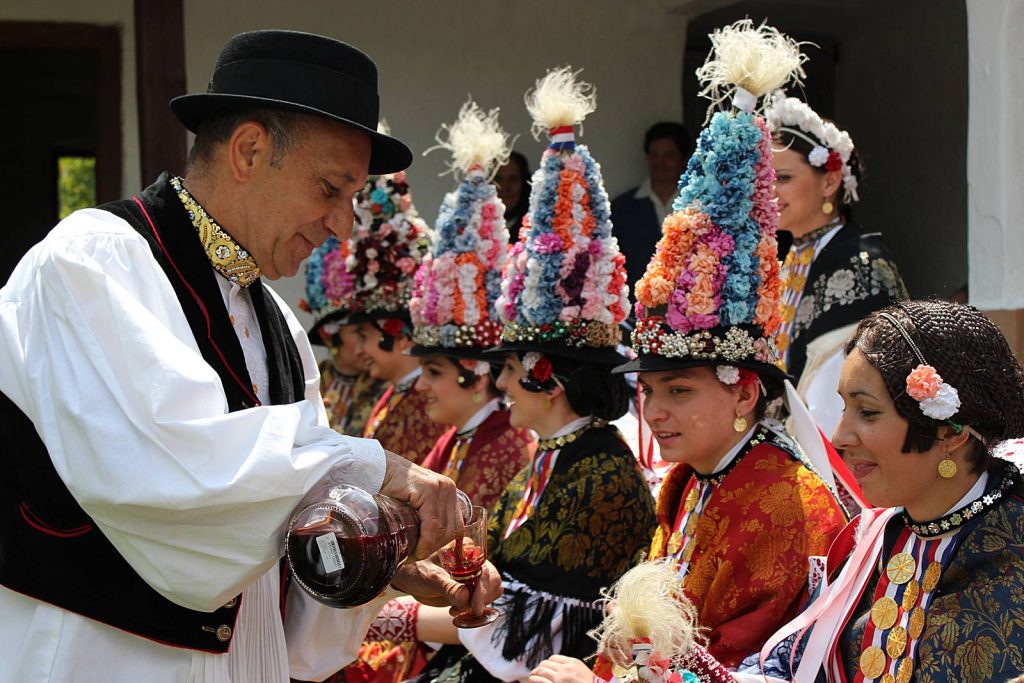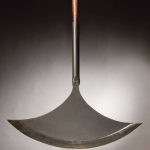TCN’s Filipa Marusic gives us an insight into more UNESCO gems with the Spring procession of the Queens from Gorjani
This Spring Procession takes place every Whitsunday in Gorjani near Đakovo. The tradition derives from Turkish times, when, according to legend, the women of Gorjani saved their husbands. The procession is to honour this event and it has therefore remained the same ever since it began and was granted the prestigious UNESCO Intangible Heritage status back in 2007.
Kraljice (Queens) are girls from the village of Gorjani who walk through their village in a procession and hold a performance which includes special songs and a dance with sabres, the girls are also referred to as Ljelje. The participants are divided into kraljice (queens) and kraljevi (kings). Kings wear sabres and male hats beautifully decorated with flowers while queens wear white garlands on their heads like brides. They visit their neighbours and families in the village and from the various musical numbers they sing, they choose a song that corresponds with whichever family they decide to visit. After that the kings have their dance with sabres and queens make musical comments on this dance in the songs they are singing. Afterwards, there is a folk dance with traditional music and other people can join in too.
Finally, the families they visit offer them food and drink and then the procession goes to the next household in the village. On the second day, they visit a different local village where they enjoy a final feast and entertainment in the home of one of the participants, although recently they just stay in Gorjani. The entire event occurs only on Whitsunday.
The tradition has some specific customs and sets of events. The young women used to meet up at the house of the one of the participants during the afternoon, when they gather together, they start the procession around the village and visit all the homes with front doors left open, they sing and dance and the hosts would give them presents. In the last 10 years, the procession has slightly altered, with the Ljelje first attending the mass on Whitsunday and then engaging in a circle dance with accompanying music (often Bećarac – which also holds UNESCO Intangible Heritage status) before finally visiting families who want to host the Ljelje in their homes.
The participants are young girls and boys, the boys play live music and collect gifts from houses they visit. The number of participants is not set but it’s usually 8 to 10 kings, 3 to 8 queens and 4 to 21 boys with music.
The history of this tradition dates back to Turkish times when the village of Gorjani was invaded and occupied by the Turks (Ottomans) who captured all the men from the village. Their wives then dressed up in colourful clothes and men’s hats decorated with artificial flowers, armed themselves and went to the Turkish camps. The notoriously suspicious Turks thought they were ghosts and chased them away, causing a distraction which helped the men to run away and escape back to their homes.
Ever since, the inhabitants of Gorjani decided to dress themselves in similar attire on Whitsunday to honour this event. This tradition has remained largely unchanged throughout the years and the only difference is that women now hold sabres instead of sickles and scythes.
All the girls who are part of procession wear festive outfits, usually made of colourful silk garments and are divided as queens and kings. Previously, this custom was widely spread throughout Slavonia, Syrmia and Baranja but it unfortunately started to disappear at the end of the 19th century. Gorjani is only village where this custom survived with discontinuation from 1966 to 2002. KUD Gorjanac is in charge of the preservation of this event, which has even been performed in Tokyo’s national opera house.
This tradition does not only provide entertaining dancing and music, but is also there to remind us how brave and resourceful the Croatian women of the past were when they distracted the Ottomans sufficiently enough to successfully free their men. This colourful event will take place this Sunday too in Gorjani – try to be part of it!
Some of the songs that can be heard during procession are these:
Mi idemo ljeljo, mi idemo kralju, ljeljo
Od dvora do dvora, od dvora do dvora, ljeljo
Do careva stola, do careva stola, ljeljo
Đe car vino pije, đe car vino pije, ljeljo
A carica spava, a carica spava, ljeljo
Car caricu budi, car caricu budi, ljeljo
Među oči ljubi, među oči ljubi, ljeljo
Ustante carice, ustante carice, ljeljo
Došle su kraljice, došle su kraljice, ljeljo!
SOURCE: Ministry of Culture, Culturenet, Kultura.hr, Mačevni Plesovi – Gorjanske ljelje, Ivan Lović – Gorjani, 2012., Tourist Board Đakovo










